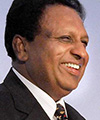Remarks of Amb (Rtd.) T. P. Sreenivasan at The Indian Education Congress 2015, New Delhi , on "Graduates of the 21st Century"
Friends, I was invited to be a Guest Speaker at the Indian Education Congress organized by FRANCHISE INDIA. I was asked to make the first presentation on “21st Century Graduates”. My comments, reconstructed from memory are below. “I should begin with a plea for anticipatory bail. I have been a professional diplomat, who strayed into higher education just four years ago. I have been trying to mix diplomacy with education! My brief is very clear. I must speak to you about the requirements of successful graduates for the 21st century and outline the efforts made by Kerala to meet them in its institutions of higher learning. Clearly, our higher education system is not geared for the challenges and opportunities of the 21st century. We need to catch up with the education revolution around the world, not only for our own needs, but also to avail of the demographic dividend on account of the largest group of young people in the world India will have in the next few years. Globalization and ITC have transformed expectations of graduates by the Governments, other employers and the society as a whole. The IT revolution, which came about without an owners’ manual, needs to be deployed for the benefit of humanity. The paradigm shift in education requires the graduates of tomorrow to be versatile and engaging, with multidisciplinary knowledge to communicate, collaborate and solve problems with critical and innovative thinking. Ethical and moral development, cognitive and interpersonal skills are equally important. They should have lifelong learning by using ICT techniques such as MOOCs, blended learning and flipped learning. We need nothing short of a Higher Education 2.0 while the rest of the world is moving into Higher Education 3.0. Kerala has many assets to cope with the transformation required. The “Kerala Model” of development, which was the subject of a debate of the Titans between Jagdish Bhagwati and Amartya Sen, is a phenomenon in which, with modest economic growth, Kerala attained social development indicators to match the developed world. Education was a beneficiary, because of the imagination of the rulers of Travancore and the arrival of the missionaries. There was a Maharani, who declared that all expenses on education should be borne by the state. Kerala today has achieved access and equity in education, but its excellence is in question, as education has not moved with the times. The high literacy rate, linguistic skills, rich literature and individual successes in India and abroad raise expectations, but the education system needs to change and change fast. We have a blue print for change. Stress has been placed in improving infrastructure, teachers training, use of technology in teaching, research, autonomy, internationalization and skills development. A whole menu of reforms is before the Government. Some changes have been made in the curriculum and teaching methods. Choice based semester system has been introduced and autonomous colleges have been set up. Skill development has become a part of the education scene. But much remains to be done. Kerala seems to lack the mindset to change and the money to invest in education. Some champions of change in all areas oppose changes in education. Absence of a prosperous private sector is also a handicap. Private Universities are still not permitted in the state. A State Assessment Council and a Faculty Academy have been on the anvil for three years. The huge gap between Kerala’s capabilities in IT and the negligible use of technology in teaching needs to be filled. RUSA funding promised to usher in big changes, but the amount allocated is small and the areas indicated are not game changing. Kerala has the tradition and the potential to excel in Education, but mindset and money are the factors that hold us back. We tend to leave things in God’s hands. After all, it is his country and he should take care of it!
Thank you.”
